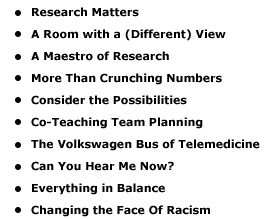RESEARCH
MATTERS
-feature
section written by Jean Florman

|
 |
When
Robyne (Halevy) Lewis (BA
’75) seeks a dream, she takes a nuts-and-bolts approach.
Lewis is an avid reader and thinks every child should be too.
When the Woodridge, Illinois principal decided the students
in her school needed better training in the reading basics,
she and her staff leveraged years of classroom observation
and experience into Leading to Reading, an innovative and
fun program that has succeeded beyond expectations. The dynamic
approach groups children according to a series of 14 skill
needs rather than by age. Teachers present each skill group
in a variety of ways—visual, tactile, kinesthetic, and
auditory—and children master each skill before moving
to the next level.
On
any particular morning during the 40-minute whole-school
LTR period, a visitor to Lewis’ Sipley Elementary
School might see children breaking pretzels to form letters,
creating bingo cards of 24 consonant blends, or saying
the sounds of letters as they form letter shapes with their
bodies (think: The Village People).
The
improvement in reading skills among Sipley students has
been staggering. Whereas several years ago, 21 percent
of the school’s third graders were below state standards
for reading, now 98 percent are at or above that measure.
Lewis says the program encourages students and teachers
to make the most of their natural inclinations to teach
and learn.
“Teachers become teachers because they are creative and don’t want
to work from a script,” she says. “And the average child will learn
as fast as we can teach them. An approach that is fun, easy, and successful is
best for both.”
She
says her time at Iowa nurtured her own passion for teaching
reading.
“I didn’t even know that elementary school libraries existed before
I took a children’s literature course at Iowa,” says Lewis, who eventually
earned a Master’s degree in library science from the University of Oregon.
She also worked at the Iowa City Public Library, an experience that led her
to believe that children were inspired to read by the topics in books. Years
later, however, Lewis came to a different understanding of what inspires and
enables children to read.
“By
the time I started LTR,” she says, “I had begun
to realize that regardless how interesting a topic might
be, struggling readers aren’t motivated to read.
Like most of us, they don’t like to do what is difficult.
But once children learn how to read, they are motivated
because it’s easy—and then they’ll read
anything.”
Jessica
Fandre, a first- and second-grade Sipley teacher agrees. “If
you don’t teach children how to decode the sounds
of language,” Fandre says, “they might be able
to learn to read by sight well enough to get through the
primary grades. But once they get to third grade, they
can’t decode for comprehension and meaning. Robyne’s
program enables children to do both.”
Launched
in 1998, Leading to Reading is an example of what the pragmatic
Lewis calls, “action research.”
“We
created the program through on-the-ground research in the
classroom,” she says. “The program is the research.”
Program
assessments show a staggering improvement in reading ability
among the primary students who participate. The average reading
ability among Sipley students, for instance, is 25 percent
higher than the average across the state. In fact, although
the program was designed to continue through third grade,
virtually all Sipley students complete it before finishing
second grade. Fandre, who has taught LTR for five years, says
the impact on her students has been “huge” regardless
of social, economic, or language background.
Twenty-five
schools across the Midwest have adopted the Leading to
Reading approach and 80 teachers and school districts have
bought copies of the LTR guide that helps educators launch
the program.
“The
program encourages us to create new ways to effectively teach
children the basics of language,” says Lewis, who spends
40 minutes a day back in the classroom teaching reading enrichment.
“And we’re always assessing the impact of what
we do. We’ve found, for instance, that students become
so proficient, they read beyond their comprehension. Quite
frankly, that’s a problem we love to have.” –by
Jean Florman
 
|